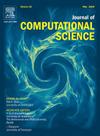Adaptive time-varying output formation tracking control for multi-agent system with dynamic event-triggered strategies
IF 3.7
3区 计算机科学
Q2 COMPUTER SCIENCE, INTERDISCIPLINARY APPLICATIONS
引用次数: 0
Abstract
This paper investigates the output feedback time-varying formation(OFTVF) tracking issue for general linear multi-agent systems(MASs). To address this issue, novel dynamic event-triggered(DET) strategies are proposed to manage the inter-agent communication effectively. It removes the assumption that constant interaction is required between agents, and therefore communication cost is reduced significantly. Then under the proposed DET strategies, an adaptive OFTVF tracking control algorithms is designed for general linear MASs. Using Lyapunov stability theory, it is demonstrated that under proper conditions the proposed protocol is implementable. Furthermore, for the constructed DET scheme, no agent exhibit the Zeno behavior. Simulation example is presented at the end of the paper to demonstrate the effectiveness of designed DET control mechanism.
具有动态事件触发策略的多智能体系统自适应时变输出队列跟踪控制
研究了一般线性多智能体系统的输出反馈时变编队(OFTVF)跟踪问题。为了解决这一问题,提出了一种新的动态事件触发(DET)策略来有效地管理智能体间的通信。它消除了agent之间需要持续交互的假设,因此显著降低了通信成本。在此基础上,针对一般线性质量,设计了自适应OFTVF跟踪控制算法。利用李雅普诺夫稳定性理论,证明了在适当的条件下所提出的协议是可实现的。此外,对于所构建的DET方案,没有agent表现出Zeno行为。最后给出了仿真实例,验证了所设计的DET控制机制的有效性。
本文章由计算机程序翻译,如有差异,请以英文原文为准。
求助全文
约1分钟内获得全文
求助全文
来源期刊

Journal of Computational Science
COMPUTER SCIENCE, INTERDISCIPLINARY APPLICATIONS-COMPUTER SCIENCE, THEORY & METHODS
CiteScore
5.50
自引率
3.00%
发文量
227
审稿时长
41 days
期刊介绍:
Computational Science is a rapidly growing multi- and interdisciplinary field that uses advanced computing and data analysis to understand and solve complex problems. It has reached a level of predictive capability that now firmly complements the traditional pillars of experimentation and theory.
The recent advances in experimental techniques such as detectors, on-line sensor networks and high-resolution imaging techniques, have opened up new windows into physical and biological processes at many levels of detail. The resulting data explosion allows for detailed data driven modeling and simulation.
This new discipline in science combines computational thinking, modern computational methods, devices and collateral technologies to address problems far beyond the scope of traditional numerical methods.
Computational science typically unifies three distinct elements:
• Modeling, Algorithms and Simulations (e.g. numerical and non-numerical, discrete and continuous);
• Software developed to solve science (e.g., biological, physical, and social), engineering, medicine, and humanities problems;
• Computer and information science that develops and optimizes the advanced system hardware, software, networking, and data management components (e.g. problem solving environments).
 求助内容:
求助内容: 应助结果提醒方式:
应助结果提醒方式:


